Brian Clegg's Blog, page 95
June 5, 2014
Welcome to The Quantum Age
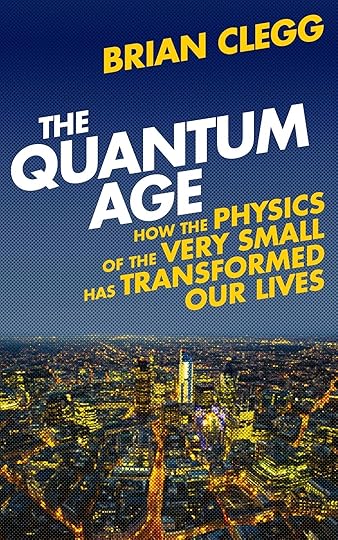 I'm delighted to say that my new book, The Quantum Age is now available - see it's web page for details or to buy. The premise is simple - we have had everything from the stone age to the steam age, but now we're in the quantum age, where quantum-based devices are everywhere (there at least seven different quantum technologies in a smartphone). The book combines an explanation of the basics of the science with the remarkable stories of the development of different applications from basics like electricity, through the natural world of quantum biology to lasers and superconducting magnets.
I'm delighted to say that my new book, The Quantum Age is now available - see it's web page for details or to buy. The premise is simple - we have had everything from the stone age to the steam age, but now we're in the quantum age, where quantum-based devices are everywhere (there at least seven different quantum technologies in a smartphone). The book combines an explanation of the basics of the science with the remarkable stories of the development of different applications from basics like electricity, through the natural world of quantum biology to lasers and superconducting magnets.As a taster, here's the introduction:
The chances are that most of the time you were at school your science teachers lied to you. Much of the science, and specifically the physics, they taught you was rooted in the Victorian age (which is quite probably why so many people find school science dull). Quantum theory, special and general relativity, arguably the most significant fundamentals of physics, were developed in the 20th century and yet these are largely ignored in schools, in part because they are considered too ‘difficult’ and in part because many of the teachers have little idea about these subjects themselves. And that’s a terrible pity, when you consider that in terms of impact on your everyday life, one of these two subjects is quite possibly the most important bit of scientific knowledge there is.
Relativity is fascinating and often truly mind-boggling, but with the exception of gravity, which I admit is rather useful, it has few applications that influence our experience. GPS satellites have to be corrected for both special and general relativity, but that’s about it, because the ‘classical’ physics that predates Einstein’s work is a very close approximation to what’s observed unless you travel at close to the speed of light, and is good enough to deal with everything from the acceleration of a car to planning a Moon launch. But quantum physics is entirely different. While it too is fascinating and mind-boggling, it also lies behind everything. All the objects we see and touch and use are made up of quantum particles. As is the light we use to see those objects. As are you. As is the Sun and all the other stars. What’s more, the process that fuels the Sun, nuclear fusion, depends on quantum physics to work.
That makes the subject interesting in its own right, something you really should have studied at school; but there is far more, because quantum science doesn’t just underlie the basic building blocks of physics: it is there in everyday practical applications all around you. It has been estimated that around 35 per cent of GDP in advanced countries comes from technology that makes use of quantum physics in an active fashion, not just in the atoms that make it up. This has not always been the case – we have undergone a revolution that just hasn’t been given an appropriate label yet.
This is not the first time that human beings have experienced major changes in the way they live as a result of the development of technology. Historians often highlight this by devising a technological ‘age’. So, for instance, we had the stone, bronze and iron ages as these newly workable materials made it possible to produce more versatile and effective tools and products. In the 19th century we entered the steam age, when applied thermodynamics transformed our ability to produce power, moving us from depending on the basic effort of animals and the unpredictable force of wind and water to the controlled might of steam. And though it is yet to be formally recognised as such, we are now in the quantum age.
It isn’t entirely clear when this era began. It is possible to argue that the use of current electricity was the first use of true quantum technology, as the flow of electricity through conductors is a quantum process, though of course none of the electrical pioneers were aware that this was the case. If that is a little too concealed a usage to be a revolution, then there can be no doubt that the introduction of electronics, a technology that makes conscious use of quantum effects, meant that we had moved into a new phase of the world. Since then we have piled on all sorts of explicitly quantum devices from the ubiquitous laser to the MRI scanner. Every time we use a mobile phone, watch TV, use a supermarket checkout or take a photograph we are making use of sophisticated quantum effects.
Without quantum physics there would be no matter, no light, no Sun ... and most important, no iPhones.
I’ve already used the word ‘quantum’ thirteen times, not counting the title pages and cover. So it makes sense to begin by getting a feel for what this ‘quantum’ word means and to explore the weird and wonderful science that lies behind it.
www.brianclegg.net/quantumage.html
Published on June 05, 2014 00:58
June 4, 2014
The Mockingbird fiasco
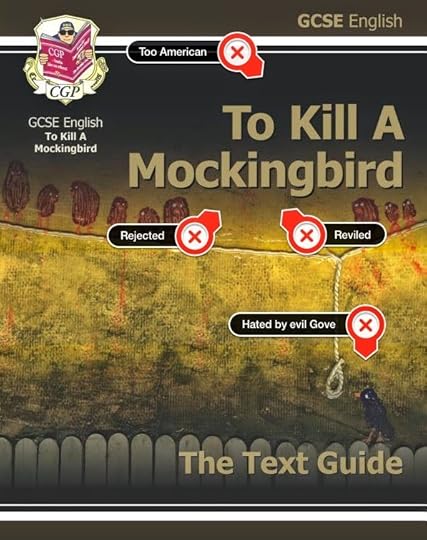 Now that the dust has settled a little over the English Literature GCSE 'Gove bans American classics' kerfuffle, it would be useful to clarify exactly what has happened and why, despite all that anguished wailing and gnashing of teeth, perhaps the outcome is a good thing.
Now that the dust has settled a little over the English Literature GCSE 'Gove bans American classics' kerfuffle, it would be useful to clarify exactly what has happened and why, despite all that anguished wailing and gnashing of teeth, perhaps the outcome is a good thing.The initial panic arose from a Sunday Times article headlined 'Gove kills the Mockingbird with ban on classic US novels', followed up by similar invective from the Guardian under the heading 'Michael Gove should not kill the Mockingbird.' (Zero for originality, people - certainly not worthy of top marks in an English GCSE.)
This was a total misinterpretation of what had really happened. Last year, the government issued guidance on what should be in the new syllabus. All it specifies is:
at least one play by Shakespeareat least one 19th century novela selection of poetry since 1789, including representative Romantic poetryfiction or drama from the British Isles from 1914 onwards.There is nothing, zilch, zero to complain about in that. Despite claims in the press it is not insisting that American classics like To Kill an Mockingbird and Of Mice and Men are removed. Surely it is perfectly reasonable to specify at least one 19th century novel (from any country) and at least one British piece of writing from the last century? If English Literature students only manage to read those four items in several years, what does this say about our teaching standards? They could easily read another ten books on top of those - which could include Mockingbird et al.
As it happened, OCR, one of the exam boards, published its decision recently on what to include and the two aforementioned American greats weren't in it, nor was The Crucible. This was what triggered the articles, but the newspapers' claims about bans had nothing to do with what had actually happened. And anyway, it's a poor English teacher who only asks his kids to read the set texts.
However, I'd take a stronger line - it's time for a change! It's over forty years since I was at school and those three books (plus Catcher in the Rye, which I could not relate to at all and HATED), were already being taught. As it happened, I loved The Crucible (and Lord of the Flies which we also did), but you are never going to get a selection that is enjoyed by everyone. The point is, it's a very poor selection if it remains stuck in aspic for over 40 years. You might argue a great book will always be a great book - I'm really not sure. I personally think Dickens, for instance, is getting more and more dated. The stories are good - so it still makes good TV - but the books are tiresome. Some classics do survive from generation to generation - Jane Austen still works brilliantly for me - but some are too much of their time. And the same may be true of these American classics.
I'm not saying to avoid American writers - of course not - but there's no need why we have to have American writers either. Just a good selection of varied, excellent writing. I would love to see a novel from the likes of Ray Bradbury (anything but the dreary Farenheit 451, the only one of his books literary types like), Gene Wolfe or Neil Gaiman (two Yanks and a Brit) to show young readers that fantasy doesn't have to be shlock vampire romances or silly swords and sorcery, but can be brilliant wordcraft that really plays with ideas. Why not a really good, well written detective story - or for that matter some high class science fiction or historical fiction? But for goodness sake, let's get away from the idea that all they should read is 'classics' (including 'modern classics' like the bemoaned titles) or 'literary fiction'. Or, for that matter, just regurgitating the stuff that the teachers were taught when they were at school. That misses the point entirely.
Published on June 04, 2014 00:46
June 3, 2014
How I rattled PETA's cage
 To be honest I have always felt that the animal rights campaigning organisation PETA is a little flaky (in part, I suspect because it is a very American organisation, so culturally takes a very different approach to us Brits). But a recent campaign by them has really dropped them to the lowest of the low in my estimation.
To be honest I have always felt that the animal rights campaigning organisation PETA is a little flaky (in part, I suspect because it is a very American organisation, so culturally takes a very different approach to us Brits). But a recent campaign by them has really dropped them to the lowest of the low in my estimation.PETA has been pushing the idea that there is a link between autism and dairy products, using the poster illustrated above. This is a classic example of making an incorrect deduction from very limited trials which certainly don't show what is being claimed, and is particularly appalling after the parallel 'autism and MMR' disaster caused by the Wakefield fiasco.
I was able to find very quickly two surveys of the research, one from Cochrane and one from the NHS/University of York that concluded that the evidence does not support the suggestion. I retweeted the tweet that originally alerted me to this, only to have PETA respond with a classic 'anecdote as data' response. This really isn't good enough.

You might as well argue (to deliberately pick an argument that PETA probably wouldn't run a campaign on) that wearing fur coats is good for your health, as if you ask people wearing them on a cold day if they feel better than people in a short-sleeved T-shirt, they will say yes*. This campaign is about as helpful.
* In case anyone thinks I am advocating the wearing of fur coats, I am not. Please read the words.
Published on June 03, 2014 00:23
June 2, 2014
What's the chances? Think AND
 Probability comes into our life in all sorts of ways, as I explore in
Dice World
, from the obvious toss of the dice and outcome of a lottery draw, through the way we assess risk, to the fundamental level of probability in the quantum particles that make up everything around us. This presents a bit of a problem because, frankly, our brains aren't wired to get the hang of probability. It doesn't fit with what we normally consider to be common sense.
Probability comes into our life in all sorts of ways, as I explore in
Dice World
, from the obvious toss of the dice and outcome of a lottery draw, through the way we assess risk, to the fundamental level of probability in the quantum particles that make up everything around us. This presents a bit of a problem because, frankly, our brains aren't wired to get the hang of probability. It doesn't fit with what we normally consider to be common sense.There's one very simple aspect of probability that people often struggle with, but that can very useful, and that's combining the chances of something occurring in two or more separate events. I think there's a very easy way of getting your head around this by considering the magic AND (as they would say in primary school).
Here's the deal. Say, for instance, you like to play the UK lottery's game Thunderball. This has a special ball (you guessed it) the Thunderball, for which you get a prize if you match just that single ball. It can be anything between 1 and 14, so you have a 1 in 14 (or to put it another a 1/14) chance of winning the Thunderball part with a single ticket. But what if you enter both the Friday and Saturday draw with your number? How does that change your chance of winning?
Common sense would probably say, clearly you are more likely to win with two goes, so let's add the probabilities together. 1/14+1/14 = 1/7 - you have a one in seven chance of winning. Unfortunately for common sense, this is clearly wrong. If it were true, you could guarantee a win by entering 14 draws, so you would have 1/14+1/14+1/14... fourteen times, adding up to 1. An absolute certainty of winning. But clearly this isn't the case. It's entirely possible that after fourteen draws your number still hasn't come up. What's more, what would happen if you entered 15 draws? Somehow you would have a 15/14 chance of winning, whatever that means.
You can, of course, guarantee a win with 14 tickets, but only by buying 1 ticket for each of the 14 numbers and just entering 1 draw - but that's not we're about here.
Okay, you might think, maybe we combine probabilities by multiplying them together. So if there's a 1/14 chance with one draw, you've a 1/14 x 1/14 = 1/196 chance with two draws. That's clearly rubbish. It suggests you are less likely to win by entering two draws. But it all makes sense if you read that 'x' as 'AND'. Because multiplying two probabilities together is the same as saying whats the chance of the first AND the second thing both happening - in this case, what's the chance of winning in both the first AND second draws, which if obviously is much smaller that just winning one.
Once you've got AND on board, it's easy enough to see how to use it to work out the chance of winning something in either draw. We just need to work out the chance we won't win in the first AND won't win in the second. Then the remaining chances are where we do win something.
The chance we won't win in the first draw is 13/14. So is the chance we won't win in the second. So the chance we won't win in the first AND the second is 13/14 x 13/14 = 169/196. So the chance we will win something is 1 minus this. 1-169/196 = 27/196. That's about 0.14 - a 14% probability, between 1/8 and 1/7. So not quite double the chances, but a lot better than with just one go.
Combining probabilities like this? Simples.
Published on June 02, 2014 04:41
May 30, 2014
The toilet roll dilemma - an online experiment
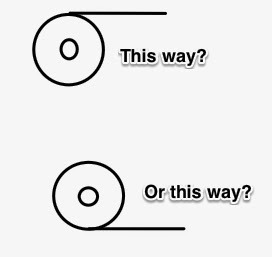 Every now and then I feel the urge to do an online experiment - today we are dealing with one of the biggest social issues to face humanity. Which way do you put the toilet roll on the holder?
Every now and then I feel the urge to do an online experiment - today we are dealing with one of the biggest social issues to face humanity. Which way do you put the toilet roll on the holder?I am personally convinced there is only one way for a sane person to do this, but not everyone agrees.
So what do you think? Which way up should we put the toilet roll? I'd be grateful for as many replies (here or on Facebook/Twitter @brianclegg) as possible.
Please don't just vote, though - I would like a logical explanation, with workings where relevant.
Thank you in anticipation. Littlendians and Bigendians have nothing on this one.
Published on May 30, 2014 03:21
May 29, 2014
DIY volcanoes with ammonium dichromate
 One of the saddest things about the way chemistry teaching has progressed is the way experiments have been made safer and safer. In our after school chemistry club I once did an experiment using hydrogen cyanide as an ingredient - somehow I can't see it being employed today. And the modern idea of a chemical volcano is the impressively bubbly but totally un-volcano like result of combining sodium bicarbonate and vinegar.
One of the saddest things about the way chemistry teaching has progressed is the way experiments have been made safer and safer. In our after school chemistry club I once did an experiment using hydrogen cyanide as an ingredient - somehow I can't see it being employed today. And the modern idea of a chemical volcano is the impressively bubbly but totally un-volcano like result of combining sodium bicarbonate and vinegar.But back in the day we could produce much more impressive volcanoes that threw out sparks and sent ash flowing, as you will discover in my latest Royal Society of Chemistry podcast.
To find out more about ammonium dichromate, take a listen by clicking play on the bar at the top of the page - or if that doesn't work for you, pop over to its page on the RSC site.
And in case you'd like to see it action (though the real thing is better):
Published on May 29, 2014 01:48
May 28, 2014
The ecologic of streaming
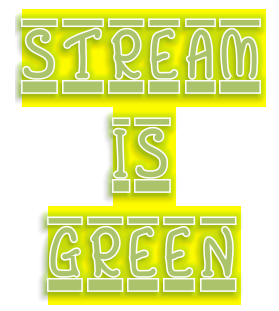 ...ishIt might seem obvious that streaming a video is more environmentally friendly than going to get a DVD and watching it, but one of the rules of ecologic is that in the environment, common sense doesn't always deliver the right results. Think, for instance, of tomatoes, where British tomatoes raised in greenhouses have a worse carbon dioxide footprint than Spanish tomatoes, despite all those extra food miles.
...ishIt might seem obvious that streaming a video is more environmentally friendly than going to get a DVD and watching it, but one of the rules of ecologic is that in the environment, common sense doesn't always deliver the right results. Think, for instance, of tomatoes, where British tomatoes raised in greenhouses have a worse carbon dioxide footprint than Spanish tomatoes, despite all those extra food miles.It would have been entirely possible that the heavy energy use at the data centre, plus the transmission costs balanced out the production, shipping and driving back and forth that is the life of a rental DVD - but no. Streaming services like Netflix and Amazon Prime really do have an environmental benefit (for the reasons above, and also because DVD players take a lot more energy than a streaming box like an Apple TV or a Smart TV with built-in streaming services) - and there's a study to prove it.
Researchers from Lawrence Berkeley Laboratory and Northwestern University have come up with impressive savings that suggest if all DVD viewing in the US in 2011 was shifted to streaming services, around 2 million tonnes of CO2 emissions could have been avoided and around 30 petajoules of energy saved—the equivalent of the amount of electricity needed to meet the demands of 200,000 US households. Not trivial.
It seems the impact of online rental/purchase of DVDs had a similar impact to streaming, but renting or buying DVDs from a physical store is much more energy intensive because of the impact of the drive. Clearly this would also be true in the UK, but my suspicion is that the impact here would be less, as car journeys in the UK tend to be shorter, and cars tend to be more environmentally friendly than those in the US. And 2011 was a long time ago in the video watching world - I suspect significantly fewer of us now drive to get a DVD (bye-bye Blockbuster).
As streaming increases, the report's authors suggest that effort should be put into improving the efficiency of end user devices and network transmission energy to bring down the energy use even further.
Even so, those of us who have largely moved from DVDs or Blurays to streaming can feel suitably smug.
If you are the kind of person who likes to dig into the actual paper, you can find it by clicking this link.
Fast Facts courtesy of your friendly neighbourhood Institute of Physics:
An estimated 1.2 billion DVDs were purchased in the US in 2011 An estimated 17.2 billion hours of DVDs were viewed in 2011 in the US An estimated 3.2 billion hours of movies and television programmes were streamed in the US in 2011 The percentages of total video streaming viewing time attributable to computers, televisions, and mobile devices in 2011 are estimated at 20%, 77%, and 3%, respectively This has been a Green Heretic production
Published on May 28, 2014 01:35
May 27, 2014
The dangers of name calling
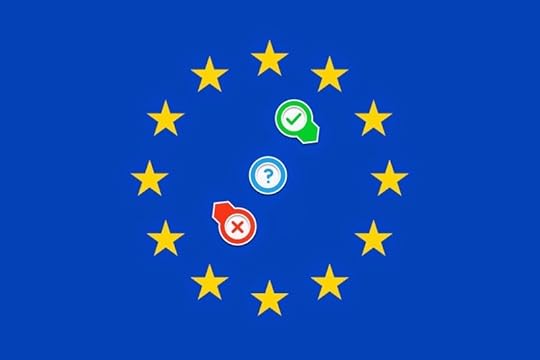 Could I apologise to people who like this blog for the science/entertaining bits that this is yet another piece on politics - but the good news is that I promise to shut up on the matter now until the general election next year.
Could I apologise to people who like this blog for the science/entertaining bits that this is yet another piece on politics - but the good news is that I promise to shut up on the matter now until the general election next year.I pride myself that my friends on Facebook and the people I follow on Twitter are nice, intelligent people, with a far better understanding of science than the average member of the public. Which is why I have been very disappointed by the social media storm coming from them during the recent UK election.
I don't normally discuss my political affiliations, but I think I ought to say up front that I am one of the few remaining Liberal Democrats in captivity, in case anyone makes assumptions from what I am about to say.
What I think has been very silly is the swathes of abusive posts and tweets about UKIP, calling them fascists and racists. (Or just launching ad hominem attacks.) Now, bearing in mind I am a Lib Dem (come on, I'm called Clegg), I should stress that I strongly dislike UKIP policies and I would never support them or vote for them. But. Name calling is not the answer. We need proper debate, not spittle-powered invective.
Some of the people who were doing the name calling identified themselves as Greens. Now you can do exactly the same thing with the Green party if you want to, but using the opposite wing of extremism. You could easily label the Greens as Marxist. Not because they are, but because a number of their policies overlap with Marxist ideas, just as a number of UKIP policies overlap with fascist ideas. It's easy to forget, but Marxism is a totalitarian, anti-democratic system just as much as fascism is. I've done work in the past with a charity that helps in Belarus, and I can tell you that if you doubt this, you have never seen Marxism in action.
But my point is not that we ought to be pointing fingers at the Greens and calling them Marxists, because mostly their supporters and activists aren't, but rather we shouldn't be pointing fingers at UKIP and calling them fascists, because mostly their supporters and activists aren't. (In both cases, the parties will contain some extremists from their respective wings.)
Instead, if parties want our respect, they should be pointing out their own policies and explaining why they are better for us, not spending all their time in attack mode. The European election gives a strong message that people are fed up of the EU as it is currently constituted, and I can understand that. It is a bloated bureaucracy. It does waste vast amounts of money and interfere where it shouldn't. I've been involved indirectly in 3 EU funded projects, and every one of them wasted vast amounts of money and didn't achieve what they were trying to do, because they were all about bureaucracy and ticking the boxes.
So tell us how you will sort the EU out. Tell us how you will make the UK work better! But don't bombard us with 'I hate UKIP' messages, because they are counter-productive and actually encourage support for more extreme parties. When the general election comes round in just under a year's time, focus on your policies and how they will things better. If you fight a negative campaign, attacking another party - however much that party's ideas may be wrong - you are making a big mistake.
Published on May 27, 2014 01:08
May 23, 2014
The penalty dilemma
 Anyone who knows me will tell you that I am passionate about football - specifically I am passionate about avoiding it at all costs, which is why the current relentless advertising on ITV for World Cup coverage is filling me with dread. But I did read something the other day that was a really interesting point on the subject of the dreary game.
Anyone who knows me will tell you that I am passionate about football - specifically I am passionate about avoiding it at all costs, which is why the current relentless advertising on ITV for World Cup coverage is filling me with dread. But I did read something the other day that was a really interesting point on the subject of the dreary game.It was in Think Like a Freak, the latest tome from the guys who brought us Freakonomics (review follows soon) and they were applying their usual sideways thinking to the matter of the England team's favourite occupation, the penalty shootout. It is a tiny bit of psychological warfare between the player taking the kick and the goalie, as the goalie has to dive before it is clear which direction the ball is going in.
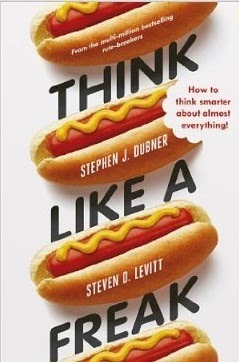 What Levitt and Dubner point out is that the best way to win is actually to kick straight at where the goalie is standing, as that way it is likely to get through whichever way he dives. Of course you couldn't do it every time, but it's certainly a winning tactic if it comes out of the blue. And yet players don't do it. Why? Because of the cost of failure. If you guess the direction of the dive wrong, or just miss because you are trying one of those fancy shots that skims in at the top of the net, then it's fair enough. But if you kick the ball straight at the goalkeeper and he just stands there and stops it, you are the kind of football player I used to be. You would be mocked and derided. Most of the time this won't happen, because the goalie will dive. But you can't be sure - and that fear of being belittled is enough to make sure that footballers don't take the option that is most likely to win.
What Levitt and Dubner point out is that the best way to win is actually to kick straight at where the goalie is standing, as that way it is likely to get through whichever way he dives. Of course you couldn't do it every time, but it's certainly a winning tactic if it comes out of the blue. And yet players don't do it. Why? Because of the cost of failure. If you guess the direction of the dive wrong, or just miss because you are trying one of those fancy shots that skims in at the top of the net, then it's fair enough. But if you kick the ball straight at the goalkeeper and he just stands there and stops it, you are the kind of football player I used to be. You would be mocked and derided. Most of the time this won't happen, because the goalie will dive. But you can't be sure - and that fear of being belittled is enough to make sure that footballers don't take the option that is most likely to win.Neat. (Please don't bombard me with footballist theories on why this is wrong. A) It's not my idea and B) I don't really care, it's just the dilemma that interests me.) You can see more about Think Like a Freak at Amazon.co.uk and Amazon.com
Published on May 23, 2014 01:08
May 22, 2014
What message does your vote send?
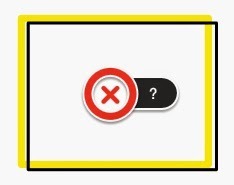 So, polling day in the European elections is upon us. As I've mentioned previously, I really don't want to vote for any of the options available, but I do intend to vote, so what to do? Let's have another go.
So, polling day in the European elections is upon us. As I've mentioned previously, I really don't want to vote for any of the options available, but I do intend to vote, so what to do? Let's have another go.Logic says something like this. Of itself, this vote won't make anything happen, because it doesn't really matter what party our Euro MPs belong to, as it won't make any difference to what the European parliament does (which is pretty limited anyway).
So the only point of the vote is to send a message to the political parties about Europe ahead of the election that really does matter, next year's general election. Some people think that they will also send a message about other policies, like the NHS or the environment, but I think this misses the point. The message that will be received will simply reflect the relevant party's attitude to Europe.
So here are my options (in order of the latest poll I've seen):
Labour: Let's be vaguely in favour of change in Europe, but not really do anythingUKIP: Let's get out of the EUConservative: Let's try to negotiate a change (almost impossible) and if we don't get one then have a referendumLib-Dem: Let's learn to love EuropeGreen: Make the EU even more bureaucratic and ineffective by having a 'multiplicity of independent bodies' and do away with free tradeEnglish Democrats: Let's end democracy as we know itOkay, they are caricatures, but close enough. Realistically, only Labour or Conservative can form the next government (with or without a coalition) - so they are the target for whatever message I send. The question is, what should that message be?
Sigh. I'm going to have to wait until I'm standing in that booth and hope inspiration comes at the last minute.
Published on May 22, 2014 00:10



